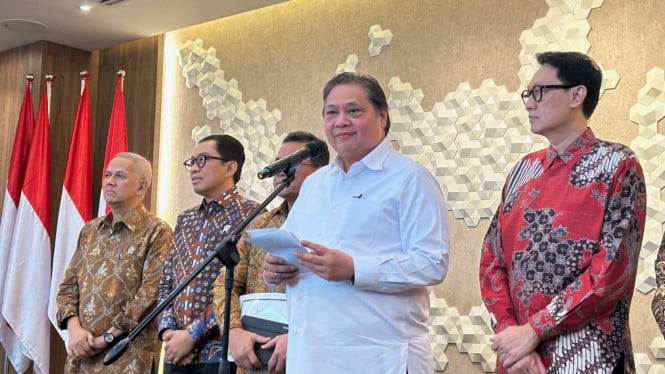JAKARTA – The Indonesian government is set to begin negotiations with the United States regarding the 32 percent import tariff imposed on several Indonesian products. In an effort to mitigate the impact of this policy, Indonesia has prepared three main proposals for the administration of US President Donald Trump.
Coordinating Minister for Economic Affairs, Airlangga Hartarto, stated that the government is currently reviewing a number of policies as part of a proposal to be submitted to the US. The first offer is to increase the volume of imports from the United States.
“Products such as wheat, cotton, and oil and gas—items we regularly import—will see increased volumes. In fact, under the National Strategic Projects (PSN), we are planning to build several refineries, and some of their components may be sourced from the United States,” said Airlangga at the Coordinating Ministry for Economic Affairs office in Central Jakarta, Monday (April 7, 2025).
The second offer, Airlangga continued, involves fiscal and non-fiscal incentives, such as reduced import duties and relaxed tax policies. However, he emphasized that Indonesia’s current import tariffs on US products are relatively low.
“We observe that our import tariffs on US products are generally low, averaging around 5 percent. For wheat and soybeans, the tariff is already zero percent. Other considerations include Income Tax (PPh) and Value Added Tax (VAT) on imports,” he explained.
Meanwhile, the third option offered is deregulation of certain non-tariff policies. This includes relaxing the Domestic Component Level (TKDN) requirement for the information and communications technology (ICT) sector, particularly for products from companies such as General Electric, Apple, Oracle, and Microsoft. The government also plans to evaluate restricted goods policies (lartas), expedite halal certification, and review other related regulations.
Airlangga stressed that all of these options are still in the finalization stage and will be included in the official proposal to be submitted to the US government. This approach is also in line with the directive of President Prabowo Subianto, who prefers resolving the issue through diplomacy rather than retaliation or imposing counter-tariffs.
“Communication with the US government, including through the US Trade Representative (USTR), is ongoing. In the near future, we will present a concrete proposal from Indonesia,” said Airlangga.
He also noted that this diplomatic approach aligns with the stance of most ASEAN countries. Indonesia, along with other ASEAN member states, will prioritize negotiations and has scheduled a meeting of ASEAN trade ministers on April 10 to discuss a collective response.
“ASEAN will not take retaliatory measures. Indonesia and Malaysia will advocate for strengthening the Trade and Investment Framework Agreement (TIFA),” he concluded.









